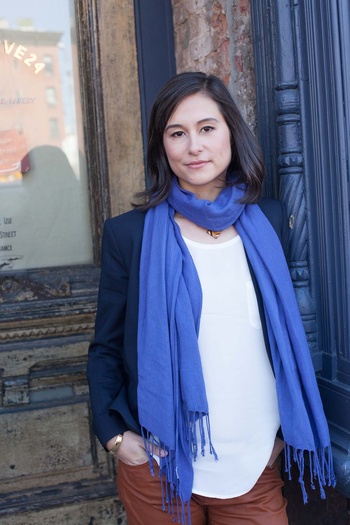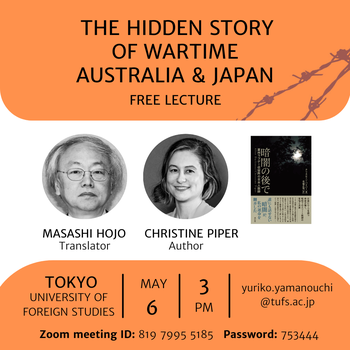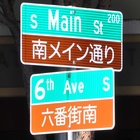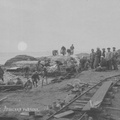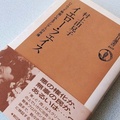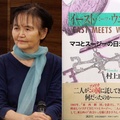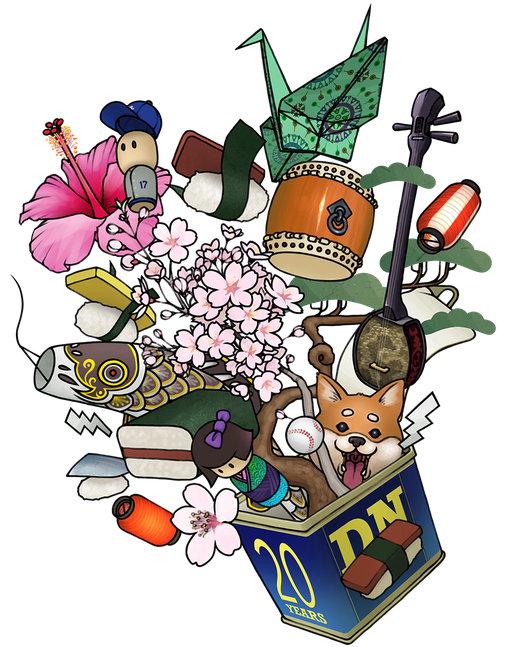Identity is created from within
--Could you tell us more about your family roots? How do you perceive your own identity? Have you ever had problems with it? Or have you ever been glad about it?
CP: My parents first met in Japan. My mother is from Funabashi, Chiba Prefecture, and my father is from Bathurst, Australia. He studied economics and Japanese at university and came to Japan as an exchange student in the 1960s. My father stayed with my mother for a month or two because her sister was studying English and wanted a foreign student to practice with.
At the time, my mother and father were only 19 years old and did not seem to have a special relationship, but they continued to correspond through letters. My mother worked for a travel agency and lived in London and Australia for a while. However, while she was in Australia, my father was in Japan and worked for a trading company in Tokyo. After a few years, they finally ended up living in the same city again, Tokyo. Ten years after they first met, they got married, and my sister was born in Tokyo, and I was born in Korea, where the family moved due to my father's work.
Growing up in Australia, I also struggled with my identity, especially in primary school. Most kids want to be like everyone else, right? My mum would make us delicious packed lunches with marinated meats and such, but my sister and I told her we wanted to be like everyone else and eat peanut butter or vegemite sandwiches. (Funny, now that my 8-year-old daughter goes to school, sushi is one of the most popular packed lunches kids can eat in the cafeteria.)
Sometimes other kids would say some mean things about my mom. Not racist, but I knew it was because she was different. I remember my sister and I proudly telling our friends at school, "It's because we don't speak Japanese." But this was the 1980s, and I didn't know many other Japanese or mixed-race families back then.
Overall, I feel very lucky to be mixed race, and most of my experiences have been positive. I went to public high school in an area with a large Korean and Chinese immigrant population, so being Asian never felt out of place, even though I was (and I think I was) the only Japanese-Australian girl in my school.
However, I remember feeling out of place throughout my high school years. After graduating, I decided to live in Japan as an exchange student, hoping that by living in Japan I would find another missing piece of my identity and finally "find" myself.
However, soon after moving to Japan, I realized that I wasn't finding my missing piece. Instead, living in Japan made me feel more Australian. I didn't find my missing piece, but I realized that identity comes from within. How you see yourself allows you to shape your identity. Essentially, I realized that identity doesn't always have to be controlled by how others see you (although that can be part of it).
Now I identify as both Japanese and Australian, and although I'm proud of my Japanese heritage, I wasn't raised with Japanese customs and traditions and I know how different I am to most Japanese people (*Read more about my exploration of self-identity here ).
--It seems that you studied Japanese language and conducted research in Japan. Could you tell us specifically what experiences and studies you undertook?
CP: When I was 31 and in my second year of a PhD in Creative Arts at the University of Technology, Sydney, I participated in a six-month residential language course for postgraduate researchers (the Japan Foundation Cultural and Academic Specialist Dispatch Programme), studying at the Japan Foundation Kansai Japanese-Language Institute and living in Osaka for six months.
I lived with international students from all over the world, including China, Korea, Norway, the UK, and Azerbaijan. Every morning, I took Japanese language classes for 2-3 hours, and in the afternoon, I focused on other classes or did research for my graduate degree. With the help of my teachers, I translated some of the diaries of Japanese internees in Australia into English, which was very helpful for my research.
I also met other researchers on Japanese internment and visited Wakayama, where many of Broome's pearl divers come from, and that's how I ended up meeting Hojo Masashi, who translated After Darkness into Japanese. His father was a pearl diver in Broome, so I met him and he told me about his experiences and gave me some materials.
--Is there anything about Japan that interests you? Also, are you thinking of publishing a novel or non-fiction book with a Japanese theme in the future?
CP: I think most novelists have the same themes that they revisit over and over again. I've only written one so far, but am currently working on my second. Themes I return to are the immigrant experience, self-identity, and the Australian landscape. Without a doubt, my experience as a mixed-race Japanese person growing up in Australia has had a major impact on me and my creative expression.
For my third book, I plan to write a memoir about my life in Japan and my family history.
I know that After Darkness could be perceived as a critical piece of Japanese society, or at least the Japanese government. I love Japanese culture and Japanese people, but Japanese society is very regimented and duty-driven. The Australian side of me struggles with that. Living in Japan, I feel suffocated by conforming to societal rules and expectations. But I hope that what I write can also highlight the positive aspects of Japanese society and culture.
* * * * *
Book Talk—AFTER DARKNESS: JAPANESE CIVILIAN INTERNMENT IN FICTION
The Hidden Story of Wartime Australia and Japan
Monday May 6, 2024 from 3 pm (Tokyo) | 4 pm (Sydney) | May 5 from 11 pm (Los Angeles)
Hybrid (In-Person & Virtual) : Tokyo University of Foreign Studies Institute for Global Area Studies | Zoom
Delve into the human side of historical events, as Australian author Christine Piper discusses her award-winning novel After Darkness (暗闇の後で) with translator Masashi Hojo.
Piper will share insights gained through research into civilian internment camps, pearl shell divers in Australia and the Japanese Army’s Unit 731. Hojo will talk about the translation process and his father’s experience as a pearl shell diver in Broome and his internment in the 1940s.
© 2023 Ryusuke Kawai


